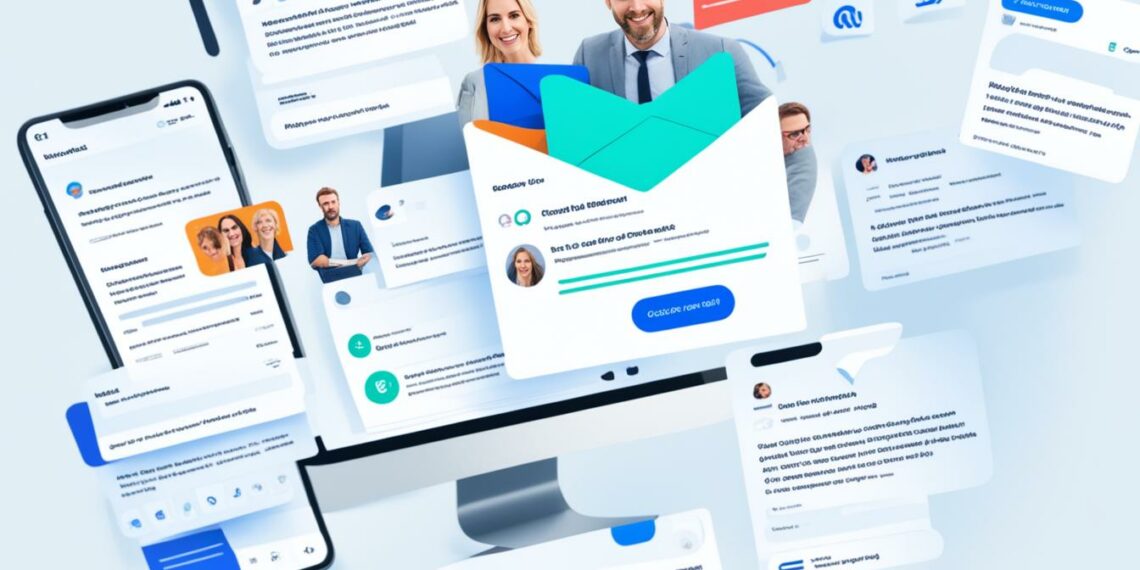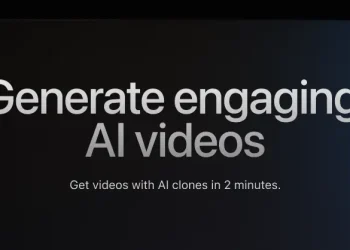Did you know that companies using AI in their email marketing can see a conversion rate increase of up to 30%? This shows how powerful AI can be in email marketing. In today’s fast digital world, it’s key to make the most of your email campaigns. This helps engage your audience and turn them into loyal customers.
AI-powered email marketing uses advanced machine learning and strong data analytics to make messages more personal and targeted. By using AI, marketers can automate tasks that used to take a lot of time. This lets them focus more on strategy and improve how well they connect with people and work more efficiently.
We’ll look into how AI can make your email marketing better, help with audience targeting, and boost your campaign’s success. This will help you get a better return on investment. For more on how AI can help your marketing, check out this article.
Key Takeaways
- AI can analyze customer behavior patterns to enhance email marketing campaigns.
- Personalized email content significantly increases the likelihood of conversions.
- Automating tasks like audience segmentation streamlines campaign management.
- AI improves open and click-through rates through dynamic content personalization.
- AI tools save time by automating routine processes and optimizing strategies.
The Evolution of Email Marketing
Email marketing has changed a lot over the years. It has evolved with new technology and how people act. Businesses moved from basic email tactics to using AI for better email strategies. At first, emails were not very engaging because they were too general.
Then, marketers learned that making emails more specific and personal was key. This made their messages more interesting to customers. Now, they focus on targeting their emails better.
From Traditional to AI-Driven Approaches
Using AI has made email marketing much better. As technology got better, predictive analytics became important. This lets marketers understand what customers like and want.
Tools like Klaviyo use predictive analytics to send emails at the best times. This helps make campaigns more successful. Companies like HubSpot use AI to create catchy email subjects and images that appeal to different people.
The Importance of Customer Engagement
Getting customers involved is crucial for email marketing. AI helps make emails feel more personal to each customer. This can lead to more sales.
With more people using email, making sure messages are relevant is key. Brands that use AI to understand customers better can improve engagement and increase sales.
| Year | Key Development | Impact |
|---|---|---|
| 1990s | Rule-based systems | Foundation of AI in email marketing |
| 2000s | Introduction of predictive analytics | Improved open and click-through rates |
| 2010s | Advancements in natural language processing | Automated content generation and A/B testing |
| 2025 | Dynamic content personalization | Enhanced productivity and engagement |
What is AI-Powered Email Marketing?
AI-powered email marketing blends new tech with old marketing ways to make email campaigns better. It uses machine learning and data analysis to improve how businesses talk to their customers. The AI email marketing definition includes new methods that predict what customers will do, make emails more personal, and make campaigns run smoother.
Definition and Key Components
AI email marketing uses several key parts to work well. The key components of AI marketing are:
- Data Analytics: Looking at customer data to make targeted campaigns.
- Segmentation: Making special groups of people based on what they like and do.
- Personalization: Sending content that matters to each person.
- Automation: Making campaigns and processes run better.
Now, 1 in 5 business people use AI or automation in their work. This means the need for good strategies is higher than ever. Using advanced tools in email marketing gives businesses an edge. It makes sure customers get emails that really speak to them.
Technologies Behind AI Email Marketing
The heart of AI email marketing is its advanced tech. Some key technologies in email marketing are:
| Technology | Description |
|---|---|
| Natural Language Processing (NLP) | Helps understand and create text, making content better. |
| Predictive Analytics | Looks at past actions to guess future ones, making campaigns better timed. |
| Spam Detection Algorithms | Finds emails that could be harmful, improving delivery rates. |
| Dynamic Content | Changes in real time based on what users do, making it more personal. |
AI tools make things like writing catchy subject lines and finding the best send times easier. By automating some marketing tasks, companies save time and make their emails work better. With 63% of people using AI for email marketing, the chance for more engagement and sales keeps growing.
Benefits of AI in Email Marketing
Using AI in email marketing brings many benefits that make campaigns more effective. It helps create unique experiences for customers, boosting how much people engage with emails. AI looks at data to understand what each subscriber likes, making emails more personal.
Enhanced Personalization at Scale
AI is great at making emails feel personal for lots of people. It looks at many inboxes to make content that matches what each subscriber likes. This makes emails more relevant, which makes customers happier and more loyal.
Improved Open and Click-Through Rates
AI uses data to find the best subject lines and when to send emails. This can increase open rates by 5-10%. It shows how AI can help marketers get more people to click on their emails.
Increased Efficiency Through Automation
AI makes simple tasks automatic, freeing up time for more important work. It helps with scheduling, writing responses, and grouping emails. This means marketing teams can focus on big ideas, saving time and making campaigns better for everyone.
| Benefit | Description | Impact |
|---|---|---|
| Personalization | Uses data to make messages fit each person’s preferences. | Higher customer satisfaction and engagement. |
| Improved Engagement Rates | Finds the best subject lines and when to send emails. | Increases open and click-through rates. |
| Automation | Makes simple tasks like A/B testing and scheduling automatic. | More time for planning and doing important work. |
How AI is Transforming Email Campaigns
Email marketing is changing fast thanks to AI. AI uses dynamic content customization to make emails more personal. This means emails can change in real-time based on what users like and do. This makes customers more engaged and likely to buy.
Dynamic Content Customization
Dynamic content changes how we send emails. It lets marketers make emails just for each person. For example, AI looks at what you’ve done before to show you things you might like. This makes customers more loyal and more likely to click on links.
Predictive Analytics for Timing and Engagement
Predictive analytics helps send emails at the best times. AI looks at when people usually check their emails. This way, emails get seen more and ignored less. It helps businesses meet what their customers want better.
| Feature | Benefit | Impact on Engagement |
|---|---|---|
| Dynamic Content Customization | Personalizes messages in real-time | Increases click-through rates |
| Predictive Analytics | Optimizes email send times | Enhances overall engagement |
| A/B Testing | Improves subject line effectiveness | Drives greater open rates |
| AI Dynamic Content | Customizes recommendations | Boosts user interaction |
Using these new methods is key to making email marketing better. Companies are turning to AI to stay ahead and meet today’s shoppers. They focus on keeping customer trust by being open about data use. With these tools, emails can be more engaging and hit the mark with their audience.
AI-Powered Email Marketing Tools to Consider
Email marketing is changing fast, with many AI tools now available to make campaigns better. Businesses should look at email platforms that offer great features. Mailchimp, HubSpot, and ActiveCampaign are leading the way with tools that boost engagement and sales.
Top AI Email Marketing Platforms
Several platforms are at the forefront with powerful features:
| Platform | Key Features | Best For |
|---|---|---|
| Mailchimp | Automated campaigns, robust analytics | Small to medium-sized businesses |
| HubSpot | Personalization, A/B testing | Comprehensive marketing solutions |
| ActiveCampaign | Email list segmentation, automation | Advanced user engagement |
| ConvertKit | Automated emails, high deliverability | Content creators |
| Brevo | Multi-channel integration | Small businesses seeking diverse outreach |
Innovative Features to Look For
When picking AI email marketing tools, look for features that make a difference:
- Personalization: 55% of marketers focus on personal touches to boost engagement.
- Predictive Analytics: These tools help find the best times to send emails and tailor content.
- Automation: Automating tasks cuts costs and saves time.
- Email List Optimization: AI can clean up email lists by removing bad addresses.
- Content Recommendations: AI suggests products to increase sales.
For those wanting to add AI to their email marketing, checking out AI-powered e-commerce platforms can show how AI can change your strategy.
Implementing AI-Powered Email Marketing Strategies
Using AI in email marketing needs a careful plan focused on your goals. You must look at your goals, set KPIs, and pick AI tools that fit your business. This careful planning makes sure your AI strategy meets your goals and helps your business grow.
Assessing Your Goals and KPIs
Setting clear goals is key to a successful email marketing campaign. Turning these goals into measurable KPIs lets marketers track how well they’re doing. Important KPIs include:
- Open rates – See how many people open your email.
- Click-through rates – Check how many people click on links in your email.
- Conversion rates – Find out how well you’re convincing people to take action.
- Unsubscribe rates – Keep an eye on how many people stop getting your emails.
Linking these KPIs with your marketing goals helps improve your strategies and make future campaigns better.
Choosing the Right AI Tools
Picking the right AI tools is key for a successful campaign. There are many tools out there, each with special features for different needs:
| Tool Name | Key Features | Best For |
|---|---|---|
| HubSpot | A/B Testing, Smart Send Times, CRM Integration | Managing your whole campaign |
| Moosend | Automation Workflows, Real-Time Analytics | Boosting campaign performance |
| ActiveCampaign | Advanced Segmentation, Predictive Sending | Reaching your target audience |
| Sendinblue | AI-Powered Reporting, Transactional Emails | Optimizing your campaigns |
| Mailchimp | Content Optimization, A/B Testing Automation | Making creative content work |
| Omnisend | Cross-Channel Profiling, Segmentation | eCommerce businesses |
| Autopilot | Visual Journey Builder, Lead Scoring | Mapping customer journeys |
Choosing tools based on what your campaigns need, like segmenting your audience or using predictive analytics, makes sure you use AI well in email marketing.

The Role of Machine Learning in Email Automation
In today’s fast-paced digital world, machine learning is key for better email automation. It helps marketers sort through huge amounts of data. This leads to more personal and engaging emails for their audience.
How Machine Learning Enhances Segmentation
Machine learning looks at data like past buys, what people browse, and who they are. This info helps make email lists that really speak to people. By targeting specific groups, marketers get better engagement and more sales.
Automation tools then use how people react to emails to make these groups even more precise. This means messages hit home even harder.
Optimizing A/B Testing with AI
A/B testing is crucial for making emails better. With machine learning, it gets even better. These algorithms look at how people react to different emails to find what works best.
This makes testing faster and smarter. It also means making quick changes to get even better results. Machine learning uses data to pick the best times to send emails and what content gets the most attention.
Pitfalls to Avoid in AI Email Marketing
Using artificial intelligence in email marketing has its ups and downs. Marketers need to watch out for common mistakes to keep their brand safe and connect well with their audience.
Privacy and Ethical Considerations
Privacy is a big worry in email marketing. It’s key to follow laws like GDPR and CCPA to keep customer data safe. Not doing so can cause big problems. Also, AI should not be used in a way that unfairly treats customers or makes decisions that harm them. Being open about how data is used helps build trust with customers.
Balancing Automation with Human Touch
Automation with AI can save a lot of time, especially with tasks like scheduling emails. But, it’s important not to forget the human side of things. Using only robotic language can push people away. Checking automated content often helps keep messages personal and emotional. Finding the right mix of automation and human touch makes for better engagement and stronger customer relationships.

| Pitfall | Description | Impact |
|---|---|---|
| Privacy Concerns | Non-compliance with data protection laws | Legal repercussions and loss of customer trust |
| Ethical Issues | Discriminatory practices in automated decision-making | Negative brand perception and customer alienation |
| Loss of Human Touch | Over-reliance on robotic tones | Reduced engagement and emotional connection |
| Poor Content Review | Inadequate quality assurance for automated messages | Possible miscommunication and brand inconsistency |
Conclusion
Using AI in email marketing brings new tools that can make email campaigns much better. Marketers can now use AI algorithms to look at lots of data and find the best times and content for emails. This leads to higher open rates—up to 18.8% for personalized emails, compared to 13.1% for others, as shown by Statista.
AI also helps with making decisions by tracking important metrics like click-through rates and conversions. These are key to making sure a campaign does well.
As AI gets better in marketing, it will help predict trends and help marketers adjust their plans. With people getting about 373 emails a day, making emails that really speak to people is crucial. This can lead to more engagement and more people taking action.
Understanding AI email marketing helps marketers build stronger bonds with their audience. This means better engagement and more conversions.
Getting good at using AI in email marketing can lead to lasting growth and success. These new tools are changing how marketing works. They’re not just an end but a new start.
For more tips on using AI in your marketing, check out resources on AI marketing strategies.
FAQ
What is AI-powered email marketing?
AI-powered email marketing uses artificial intelligence to make emails better. It personalizes messages, sorts out who gets what, and automates sending emails. This makes emails more engaging and effective.
How does AI improve email campaign personalization?
AI looks at lots of customer data to understand what people like. It then sends out emails that match what each person wants. This makes emails more relevant and gets better results.
What are the benefits of using AI in email marketing?
Using AI in email marketing makes emails more personal and engaging. It also boosts open and click rates. Plus, it automates tasks, letting marketers focus on strategy and get better results.
Which AI tools are recommended for email marketing?
Top AI tools for email marketing include Mailchimp, HubSpot, and Bloomreach. They offer features like smart segmentation, detailed analytics, and real-time tweaks. These help make email campaigns better.
How can I implement AI in my email marketing strategy?
Start by thinking about what you want to achieve and what matters most. Pick AI tools that fit your goals. Then, test them out to see how well they work. Always keep checking to make sure they keep working well.
What role does machine learning play in email automation?
Machine learning is key in email automation. It helps sort out who gets what and finds the best content. It looks at how people interact with emails to make campaigns more targeted.
What are common pitfalls to avoid with AI email marketing?
Don’t forget about privacy and ethics when using AI in emails. It’s important to follow laws like GDPR and CCPA. Also, make sure emails still feel human to avoid sounding too robotic.




